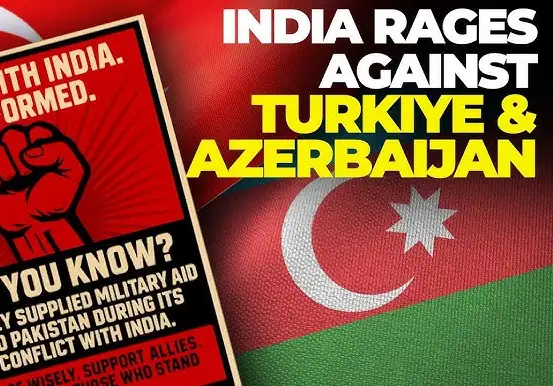India Voices Concern Over Turkiye’s Alleged Support to Pakistan During Operation Sindoor; CAIT Calls for Travel Boycott
Tensions between India and Turkiye have intensified following reports suggesting that Turkiye may have supported Pakistan during Operation Sindoor, a strategic counter-terror mission launched by Indian forces. This revelation has sparked strong reactions not just from the Indian government but also from influential trade bodies, with the Confederation of All India Traders (CAIT) calling for a nationwide boycott of travel to Turkiye and Azerbaijan.

Alleged Foreign Involvement Raises Alarms
Indian officials have expressed unease over credible intelligence inputs indicating Turkiye’s possible assistance to Pakistan during the course of Operation Sindoor. While exact details remain classified, preliminary findings point to technical and logistical aid from Turkiye, potentially aimed at bolstering Pakistan’s defense mechanisms in sensitive border areas.
The Ministry of External Affairs (MEA) has taken note of the development and is currently evaluating possible diplomatic responses. Discussions are reportedly underway regarding future engagements with Turkiye, including the prospect of reducing bilateral cooperation if the allegations are confirmed.
CAIT Urges Citizens to Rethink Travel Plans
In a parallel response from civil society, CAIT—a key trade organization representing millions of Indian business owners—has called for a voluntary travel ban to Turkiye and Azerbaijan. In a press release issued Wednesday, CAIT stated that both nations have shown “complete disregard for India’s sovereignty” by allegedly aligning themselves with Pakistan during a critical security operation.
Praveen Khandelwal, Secretary General of CAIT, remarked, “No nation that supports adversaries of India should benefit from Indian tourism or trade. We strongly advise Indian citizens to choose alternate destinations that respect our territorial integrity.”
This appeal has gained traction on social media, where users have launched campaigns using hashtags such as #BoycottTurkiye and #SupportIndia, urging fellow citizens to refrain from visiting countries that support anti-India elements.
A Pattern of Pro-Pakistan Alignment
Turkiye’s stance on South Asian geopolitics has often been viewed with suspicion in New Delhi. President Recep Tayyip Erdoğan has, on multiple occasions, publicly voiced support for Pakistan, especially on the Kashmir issue—a move that India sees as an intrusion into its domestic affairs.
In 2020, Turkiye drew a sharp response from India after Erdoğan made remarks at the United Nations critical of India’s internal policies. Since then, diplomatic ties between the two countries have remained tepid, with India reassessing its strategic and economic interests in the region.
Adding to the complexity is Azerbaijan’s growing closeness to both Turkiye and Pakistan. The trilateral cooperation among the three nations, particularly in defense and military exercises, has raised fresh concerns in Indian strategic circles. The alignment appears to be evolving into a regional bloc that could pose challenges to India’s national interests.
Operation Sindoor: A Sensitive Mission
While much of Operation Sindoor remains under wraps, defense analysts suggest it was aimed at dismantling terror infrastructure operating near India’s borders. The mission, believed to have involved high-precision strikes and multi-agency coordination, was successful in neutralizing several threats.
The timing of Turkiye’s alleged support to Pakistan during the operation has complicated diplomatic dynamics. Experts suggest that external involvement in security matters not only threatens India’s operational success but also sets a dangerous precedent for foreign interference.
Growing Public Discontent
Apart from official concerns, the Indian public has shown a strong reaction to the reports. Online forums and news platforms have seen a surge in anti-Turkiye sentiment, with many urging the government to take firmer steps against nations that support Pakistan’s agenda.
Influencers, travel bloggers, and even some celebrities have voiced support for the travel boycott, warning that vacationing in nations hostile to India could send the wrong message. With Turkiye previously ranking among the top emerging travel destinations for Indian tourists, the backlash could significantly affect its tourism revenues.
Impact on Bilateral Ties and Trade
The recent developments may prompt India to reconsider its engagement with Turkiye across multiple sectors. Turkiye has investments and collaborative interests in areas such as infrastructure, aviation, and higher education in India. However, any confirmation of involvement in Pakistan’s defense efforts could lead to the re-evaluation—or even suspension—of these partnerships.
Similarly, Azerbaijan’s growing military cooperation with Pakistan and Turkiye may draw diplomatic scrutiny. India could respond by strengthening ties with strategic partners like the UAE, Saudi Arabia, and Israel, who have remained neutral or supportive of India’s security concerns.
What’s Next for India’s Foreign Policy?
This situation underscores the need for India to review its foreign relations strategy, especially with countries that openly support Pakistan’s narrative. While India has historically maintained a balanced approach toward West Asia, this episode could trigger a strategic shift in how it engages with the broader region.
Going forward, India may seek greater intelligence cooperation with trusted allies and enhance cyber and defense preparedness against hostile foreign influence during military operations.
Conclusion
The controversy surrounding Turkiye’s reported involvement during Operation Sindoor has added a new layer of complexity to India’s diplomatic landscape. As public outrage grows and calls for economic and travel boycotts intensify, the Indian government is likely to tread cautiously but firmly.
With its global standing on the rise, India is increasingly unwilling to tolerate interference in its security matters. Whether Turkiye will adjust its policies remains to be seen, but for now, a significant cooling of relations appears inevitable.






